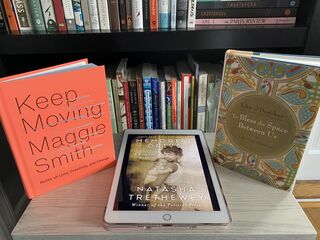It was a thrill to see the world become captivated by the nation’s first-ever youth poet laureate—Amanda Gorman—as she read The Hills We Climb during the inauguration of President Joseph Biden on January 20. The poem, and her recitation, resonated with many because of her ability to engage the mind, to validate our collective emotions, and to soothe us in the days following the insurrection at our nation’s Capitol.
We seek harm to none and harmony for all
Let the globe, if nothing else, say this is true:
That even as we grieved, we grew
That even as we hurt, we hoped
That even as we tired, we tried
—Excerpt from The Hills We Climb by Amanda Gorman
The way people embraced Ms. Gorman got me thinking about how poets are uniquely qualified to teach us about resilience. Prior to the inauguration, I’d read three books written by poets, in the categories of inspiration, memoir, and prayer. Maggie Smith’s Keep Moving is a collection of “notes on loss, creativity, and change.” Natasha Trethewey’s breathtaking memoir, Memorial Drive, is about the former poet laureate’s adolescent experience losing her mother to violence. And John O’Donohue’s To Bless the Space Between Us is a book of blessings, of which journalist Connie Schultz says, "One needn’t be Catholic (I’m not) or Irish (I am, but I try not to brag) to appreciate O’Donohue’s calm and reassuring presence on every page of his book.”
The throughline in these titles, and in Gorman’s work, is the idea that the very act of reflection—making space to sit with difficult emotions—strengthens our ability to recover effectively from the inevitable challenges and obstacles life throws at us. As an individual. As a family. As a society.
“Reflect on what you’ve lived through—and look, you’re still here. Look back at the road you’ve traveled to get to this place, and know you’ve built the strength to travel the next stretch— and the next one, and the next.”
—From Keep Moving by Maggie Smith

Remarkable Resilience
Adversity—no one gets through life without making its acquaintance. Yet we can become resilient in the face of adversity if we focus on the inextricably linked connections between our thoughts, our feelings, and our behavior.
The way we view hardship strongly affects whether or not we will overcome challenges. Having a resilient mindset won’t shield you from difficult experiences or negate feelings of unpleasantness, yet resilient people spend their energy focused on situations and events where they have control and influence. Those who possess resilience allow themselves to feel the dark emotions—grief, fear, despair—and then seek to view personal crises as opportunities for learning and growth.
The Resilience Perspective
Essential components of emotional well-being consist of having accurate perceptions of your capabilities, strengths, and weaknesses. Living with values—accepting achievements and failures—helps us to keep the opinions of others in perspective. Research shows there is a direct association between emotional intelligence, self-esteem, and life satisfaction.
Like a tangled ball of yarn, your head, heart, and hands are tethered. Authentic emotional intelligence is a byproduct of continuous reflection. The good news is that for those fortunate enough to have resilience pre-wired into their temperament, resilience skills can be strengthened. The even better news is that for those among us more vulnerable, resilience skills can be taught.
Like learning to read a poem.
Poetry and Resilience
Numerous studies confirm that the written word is an incomparable vehicle for the exploration of human social and emotional life. Literary critics, philosophers, and psychologists alike have long advanced the notion that one of poetry’s main jobs is to raise social consciousness. And many studies have shown that for people struggling with chronic illness, poetry as a therapeutic intervention improves emotional resilience and decreases anxiety.
Like learning to do anything, skill-building begins when you take that first step. A great place to start to strengthen your resilience with poetry might be to immerse yourself in one of the books mentioned earlier. If, like me, you’re always on the lookout for meditations that remind you to live your life with intention, then Smith’s Keep Moving or O’Donohue’s To Bless the Space Between Us is for you.
If you’ve suffered a devastating loss like Trethewey and yearn for a model of resiliency, I highly recommend listening to the audio of Memorial Drive; it is poetry and resilience personified.
Or perhaps you’d prefer a more detailed roadmap for using poetry to build your recovery capacity, in which case I’d suggest digging into How to Read a Poem: And Fall in Love With Poetry by Edward Hirsch.
“We live in a superficial, media-driven culture that often seems uncomfortable with true depths of feeling. Indeed, it seems as if our culture has become increasingly intolerant of that acute sorrow, that intense mental anguish and deep remorse which may be defined as grief. We want to medicate such sorrow away. We want to divide it into recognizable stages so that grief can be labeled, tamed, and put behind us.
I don’t think we should underestimate the capacity of tenderness that poetry opens within us.”
—From How to Read a Poem: And Fall in Love with Poetry by Edward Hirsch
You simply can’t go wrong reading any of the selections I’ve shared here. Whether you connect with a poem’s title or imagery, or you relate to its sentiments or theme, reading what poets have to say will allow you to sit inside your experiences in a way that will strengthen your ability to cope with adversity.
“Our times are desperate for meaning and belonging. In the parched deserts of postmodernity, a blessing can be like the discovery of a fresh well.”
—From To Bless the Space Between Us by John O’Donohue
And curling up with a good book will always do more than strengthen your resilience. Reading poetry will allow you to learn about our social world, and as a result, foster your respect for divergent points of view. Something our world is greatly in need of.
To learn more about Lynne Griffin, visit her website.




